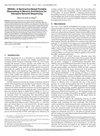SAFE: Sharing-Aware Prefetching for Efficient GPU Memory Management With Unified Virtual Memory
IF 1.4
3区 计算机科学
Q4 COMPUTER SCIENCE, HARDWARE & ARCHITECTURE
引用次数: 0
Abstract
As the demand for GPU memory from applications such as machine learning continues to grow exponentially, maximizing GPU memory capacity has become increasingly important. Unified Virtual Memory (UVM), which combines host and GPU memory into a unified address space, allows GPUs to utilize more memory than their physical capacity. However, this advantage comes at the cost of significant overheads when accessing host memory. Although existing prefetching techniques help alleviate these overheads, they still encounter challenges when dealing with irregular workloads and dynamic mixed workloads. In this paper, we demonstrate that the regularity of workloads is strongly correlated with the sharing status of UVM memory blocks among the Streaming Multiprocessors (SMs) of GPUs, which in turn impacts the effectiveness of prefetching. In addition, we propose the安全:共享感知预取高效GPU内存管理与统一的虚拟内存
随着机器学习等应用对GPU内存的需求呈指数级增长,最大化GPU内存容量变得越来越重要。UVM (Unified Virtual Memory)将主机和GPU的内存整合到一个统一的地址空间中,使GPU可以使用比其物理容量更多的内存。然而,这种优势是以访问主机内存时的大量开销为代价的。尽管现有的预取技术有助于减轻这些开销,但在处理不规则工作负载和动态混合工作负载时,它们仍然会遇到挑战。在本文中,我们证明了工作负载的规律性与gpu的流多处理器(SMs)之间的UVM内存块共享状态密切相关,这反过来影响了预取的有效性。此外,我们还提出了共享感知预取技术SAFE,该技术可以根据访问的内存块的共享状态动态调整预取策略。SAFE通过利用统一的tlb (utlb)有效地跟踪内存块的共享状态,并为每个块强制定制预取配置。这种方法不需要修改硬件,性能开销可以忽略不计。我们的评估表明,对于主要具有不规则内存访问模式的工作负载,SAFE比UVM默认预取器的性能提高了6.5倍,平均提高了3.6倍。
本文章由计算机程序翻译,如有差异,请以英文原文为准。
求助全文
约1分钟内获得全文
求助全文
来源期刊

IEEE Computer Architecture Letters
COMPUTER SCIENCE, HARDWARE & ARCHITECTURE-
CiteScore
4.60
自引率
4.30%
发文量
29
期刊介绍:
IEEE Computer Architecture Letters is a rigorously peer-reviewed forum for publishing early, high-impact results in the areas of uni- and multiprocessor computer systems, computer architecture, microarchitecture, workload characterization, performance evaluation and simulation techniques, and power-aware computing. Submissions are welcomed on any topic in computer architecture, especially but not limited to: microprocessor and multiprocessor systems, microarchitecture and ILP processors, workload characterization, performance evaluation and simulation techniques, compiler-hardware and operating system-hardware interactions, interconnect architectures, memory and cache systems, power and thermal issues at the architecture level, I/O architectures and techniques, independent validation of previously published results, analysis of unsuccessful techniques, domain-specific processor architectures (e.g., embedded, graphics, network, etc.), real-time and high-availability architectures, reconfigurable systems.
 求助内容:
求助内容: 应助结果提醒方式:
应助结果提醒方式:


